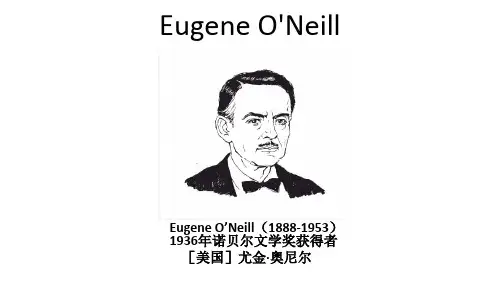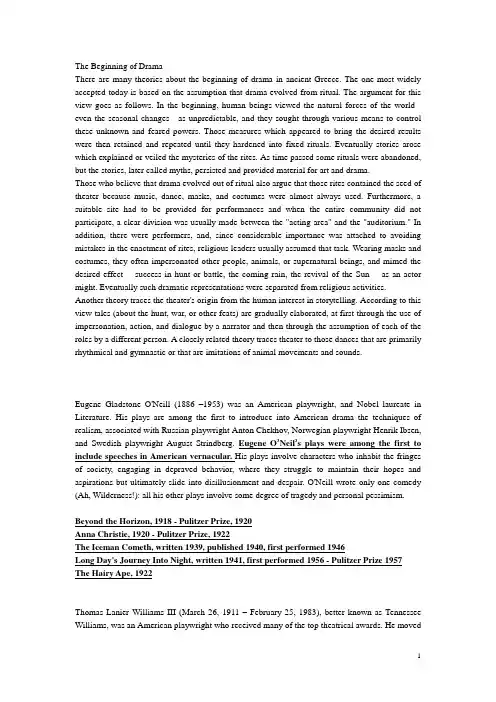《尤金·奥尼尔》PPT课件
- 格式:ppt
- 大小:127.00 KB
- 文档页数:15










The Beginning of DramaThere are many theories about the beginning of drama in ancient Greece. The one most widely accepted today is based on the assumption that drama evolved from ritual. The argument for this view goes as follows. In the beginning, human beings viewed the natural forces of the world - even the seasonal changes - as unpredictable, and they sought through various means to control these unknown and feared powers. Those measures which appeared to bring the desired results were then retained and repeated until they hardened into fixed rituals. Eventually stories arose which explained or veiled the mysteries of the rites. As time passed some rituals were abandoned, but the stories, later called myths, persisted and provided material for art and drama.Those who believe that drama evolved out of ritual also argue that those rites contained the seed of theater because music, dance, masks, and costumes were almost always used. Furthermore, a suitable site had to be provided for performances and when the entire community did not participate, a clear division was usually made between the "acting area" and the "auditorium." In addition, there were performers, and, since considerable importance was attached to avoiding mistakes in the enactment of rites, religious leaders usually assumed that task. Wearing masks and costumes, they often impersonated other people, animals, or supernatural beings, and mimed the desired effect -- success in hunt or battle, the coming rain, the revival of the Sun -- as an actor might. Eventually such dramatic representations were separated from religious activities. Another theory traces the theater's origin from the human interest in storytelling. According to this view tales (about the hunt, war, or other feats) are gradually elaborated, at first through the use of impersonation, action, and dialogue by a narrator and then through the assumption of each of the roles by a different person. A closely related theory traces theater to those dances that are primarily rhythmical and gymnastic or that are imitations of animal movements and sounds.Eugene Gladstone O'Neill (1886 –1953) was an American playwright, and Nobel laureate in Literature. His plays are among the first to introduce into American drama the techniques of realism, associated with Russian playwright Anton Chekhov, Norwegian playwright Henrik Ibsen, and Swedish playwright August Strindberg. Eugene O’Neil’s plays were among the first to include speeches in American vernacular. His plays involve characters who inhabit the fringes of society, engaging in depraved behavior, where they struggle to maintain their hopes and aspirations but ultimately slide into disillusionment and despair. O'Neill wrote only one comedy (Ah, Wilderness!): all his other plays involve some degree of tragedy and personal pessimism.Beyond the Horizon, 1918 - Pulitzer Prize, 1920Anna Christie, 1920 - Pulitzer Prize, 1922The Iceman Cometh, written 1939, published 1940, first performed 1946Long Day's Journey Into Night, written 1941, first performed 1956 - Pulitzer Prize 1957 The Hairy Ape, 1922Thomas Lanier Williams III (March 26, 1911 – February 25, 1983), better known as Tennessee Williams, was an American playwright who received many of the top theatrical awards. He movedto New Orleans in 1939 and changed his name to "Tennessee," the state of his father's birth. He won the Pulitzer Prize for Drama for A Streetcar Named Desire in 1948 and for Cat on a Hot Tin Roof in 1955. In addition, The Glass Menagerie (1945) and The Night of the Iguana (1961) received New York Drama Critics' Circle Awards. His 1952 play The Rose Tattoo received the Tony Award for best play.Arthur Asher Miller (October 17, 1915 – February 10, 2005) was an American playwright and essayist. He was a prominent figure in American literature and cinema for over 61 years, writing a wide variety of plays, including celebrated plays such asThe Crucible, A View from the Bridge, All My Sons, and Death of a Salesman,which are still studied[1] and performed[2] worldwide. Miller was often in the public eye, most famously for refusing to give evidence against others to the House Un-American Activities Committee, being the recipient of the Pulitzer Prize for Drama among countless other awards, and for his marriage to Marilyn Monroe. Miller is considered by audiences and scholars as one of America's greatest playwrights, and his plays are lauded throughout the world.Edward Franklin Albee III (born March 12, 1928) is a three time Pulitzer Prize winning American playwright known for works including Who's Afraid of Virginia Woolf?, The Zoo Story, The Sandbox and The American Dream. His works are considered well-crafted and often unsympathetic examinations of the modern condition. His early works reflect a mastery and Americanization of the Theatre of the Absurd that found its peak in works by European playwrights such as Jean Genet, Samuel Beckett, and Eugène Ionesco. Younger American playwrights, such as Pulitzer Prize-winner Paula Vogel, credit Albee's daring mix of theatricalism and biting dialogue with helping to reinvent the post-war American theatre in the early 1960s. Albee's dedication to continuing to evolve his voice — as evidenced in later productions such as The Goat: or, Who Is Sylvia? (2000) — also routinely marks him as distinct from other American playwrights of his era.。

第四节奥尼尔一、生平和创作尤金·奥尼尔(1888—1953)是美国现代著名剧作家,美国现代戏剧的奠基人,表现主义戏剧的代表作家。
父亲詹姆斯·奥尼尔是颇负盛名的演员,以扮演基度山伯爵而闻名。
奥尼尔自幼随父亲所在剧团到处流动,跑遍了美国各大市镇。
戏院、车船、旅馆是他童年时代的家,舞台是他最熟悉的地方。
母亲弹一手好钢琴,所以他从小就喜欢音乐。
1906年考入普林斯顿大学,因恶作剧,翌年休学并决定不再复学。
这期间他接触了尼采学说,无政府主义及社会主义等思潮。
此后他开始了充满冒险的生活。
他曾到洪都拉斯淘过金,爱读麦尔维尔、杰克·伦敦和康拉德的作品。
他几度当水手,去过非洲、南美、英国等地,做过流浪汉,浪迹街头、海滩。
这段时期生活很艰苦,有时非常潦倒,饭都吃不上,多住在下等旅馆,接触的都是水手、码头工人、流浪汉和妓女。
1912年底因患肺结核,住进了疗养院。
住院期间,他静下心来回顾、总结自己的过去,并思考将来。
他决定从事戏剧创作。
他潜心研读了大量古希腊悲剧、莎士比亚、易卜生和斯特林堡等戏剧大师的作品,并开始写剧。
1914年他进哈佛大学贝克尔教授主持的47戏剧工作室学习一年。
1916年他加入普罗文斯顿剧社,并在小剧场上演他的独幕剧。
“普罗文斯顿”阶段是奥尼尔的思想形成阶段。
他和一批富于进取精神的艺术家们一道,致力于美国的戏剧改革,为严肃的现代戏剧开辟道路。
1920年是奥尼尔生活中的重要转折点。
《天边外》上演获巨大成功,他名扬国内外。
此后的14年里,他有21部作品陆续上演。
1936年他获诺贝尔文学奖。
1937年建“大道别墅”,在别墅中他创作了晚期最重要的几个剧本。
1953年11月病逝于波士顿的一家旅馆里。
奥尼尔一生创作了近50部剧本,除《啊!荒野》是唯一的喜剧外,全是悲剧。
其作品4次获普利策奖。
奥尼尔的创作大致可分为三个阶段。
从1913年至1920年为第一阶段,也是习作阶段,主要从事短剧创作。
Eugene O'Neill: The Maker of Modern American
Drama
作者: 郭继德
出版物刊名: 外国文学研究
页码: 6-12页
主题词: 奥尼尔;自然主义影响;实验戏剧;现实主义悲剧
摘要:尤金@奥尼尔是现代美国戏剧的缔造者和诺贝尔文学奖金的荣膺者,一生写了50余部剧作.他早期的剧作受自然主义影响,但基调是现实主义的;中期的剧作多是实验戏剧,有表现主义悲剧、精神分析悲剧和信仰探索悲剧;晚年的剧作是更加正视惨淡人生的现实主义悲剧.奥尼尔的剧作有深远影响,为世界剧坛做出了卓尔不群的贡献.。